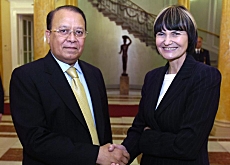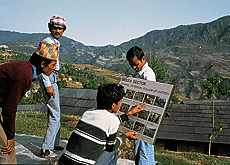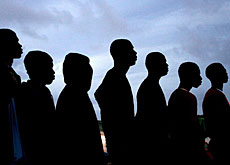Taxation tops Swiss-Bangladeshi talks

Switzerland and Bangladesh say they intend to sign a bilateral agreement on double taxation. The announcement came after a high-level meeting in Bern on Friday.
The talks between Foreign Minister Micheline Calmy-Rey and her Bangladeshi counterpart, Morshed Khan, were the first of their kind in six years.
A government statement said the meeting was a sign of “expanding relations” between the two countries.
Bangladesh has recorded strong economic growth in recent years, averaging around five per cent, which has benefited Swiss-Bangladeshi trade.
Swiss exports to Bangladesh were up to SFr92 million ($74 million) last year and goods going in the other direction were worth SFr82 million. Direct Swiss investment amounts to SFr160 million.
Growing trade has made the issue of double taxation more urgent. Calmy-Rey and Khan agreed during their working lunch to “work rapidly towards concluding a bilateral agreement on double taxation”.
At the multilateral level, the two ministers discussed United Nations reforms and the creation of the new Human Rights Council, which will be based in Geneva.
2006 marks the 30th anniversary of Swiss government support for development aid projects.
Focus country
Bangladesh is one of the “focus” countries of the Swiss Agency for Development and Cooperation (SDC). Last year, the SDC contributed more than SFr15 million ($12 million) in aid to the Asian nation.
The SDC concentrated its efforts on support for the country’s education system, microfinance schemes to encourage small businesses, as well as strengthening local institutions and good governance.
Bangladesh has reduced child mortality – now standing at 4.8 per cent – leading to lower population growth of 1.7 per cent in 2003, according to the World Bank. In addition dependence on foreign aid has dropped from eight per cent of gross domestic product in 1990 to less than two per cent last year.
The country can produce enough crops to feed itself; a remarkable achievement considering its population has doubled (138 million in 2005) in the past 30 years.
However, it is still one of the world’s least developed nations. It is estimated that about half of its people live on less than one dollar a day, and rampant corruption and widespread crime has hampered further development.
The country was hit by a series of bomb attacks last year, attributed to fringe Islamic groups.
The low-lying country also suffers from recurring flooding and cyclones.
swissinfo with agencies
Swiss aid to Bangladesh in 2005: SFr15.17 million.
Focus for SDC funding: Education, sustainable land use, small businesses, good governance at community level, strengthening local institutions.
SDC partners: Bangladesh government and ministries, non-governmental organisations, other donor countries such as Britain and Sweden, and international organisations including the World Bank.
Recent comparative studies suggest that Bangladesh has overtaken India in terms of social development: lower infant and maternal mortality rates, higher child immunisation rates, better access to clean water and sanitation, and higher primary school enrolments as well as the elimination of gender disparity in schooling opportunities.
The World Bank says NGOs have played a key role in Bangladesh’s social development, being active in virtually every activity in the country – poverty alleviation, health, education, and social and environmental protection.

In compliance with the JTI standards
More: SWI swissinfo.ch certified by the Journalism Trust Initiative



You can find an overview of ongoing debates with our journalists here. Please join us!
If you want to start a conversation about a topic raised in this article or want to report factual errors, email us at english@swissinfo.ch.